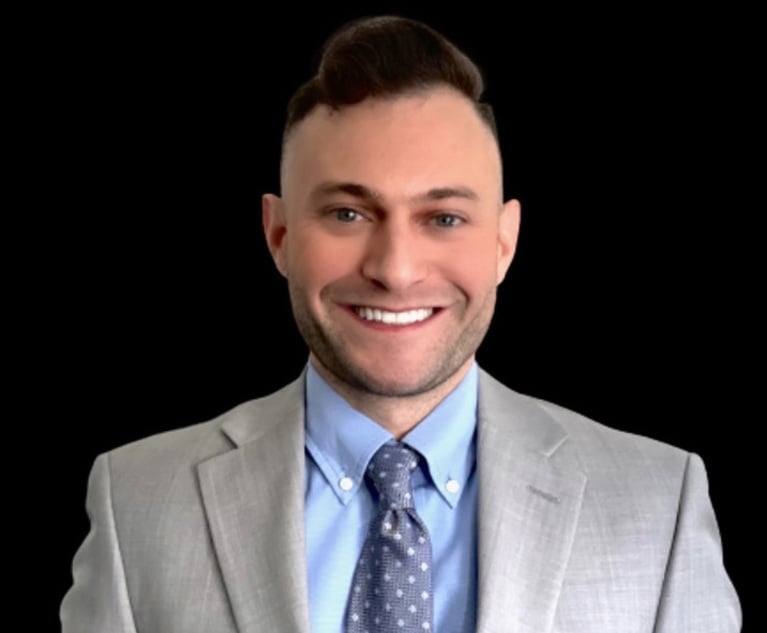Gilead Accusers Say Supreme Court Has Changed the Game on Licensing
Durie Tangri's Mark Lemley, an attorney for a would-be class of consumers and insurers, says a 2015 ruling on a Spider-Man toy established limits on royalties that drug companies are ignoring.
May 16, 2019 at 03:54 PM
5 minute read

If HIV patients and their insurers can win a court ruling that leads to lower drug prices, they might have Spider-Man to thank.
Plaintiffs leveled 137 pages of spectacular—if not altogether new—allegations against Gilead Sciences Inc., Bristol-Myers Squibb Co., Japan Tobacco Inc. and Johnson & Johnson subsidiary Janssen R&D Ireland on Tuesday. They accuse the companies of inflating the price of HIV meds through collusive licensing agreements, “crippling this nation's ability to stop new HIV infections.”
Staley v. Gilead Sciences comes as political pressure is being applied on the U.S. government to “break” patent protection for Gilead's Truvada medicine, and as the House of Representatives weighs drug pricing bills. But some of the same arguments in Staley were leveled against the same parties over the same drugs and licensing agreements a few years ago in the same Northern District of California. Judge William Alsup dismissed them in AIDS Healthcare Foundation v. Gilead Sciences, ruling that under U.S. Court of Appeals for the Ninth Circuit case law Gilead had no legal duty to market its most cutting-edge antiviral as a stand-alone product.
One of the attorneys for the new would-be class, Durie Tangri's Mark Lemley, said Wednesday he believes the Supreme Court has changed the game when it comes to license agreements that extend protection beyond a patent's expiration. The high court ruled in 2015 that a license agreement Marvel Enterprises struck with the inventor of a Spider-Man toy was unenforceable once the 20-year term of the patent was up.
“What's fundamentally different here,” Lemley said, is the contracts Gilead signed with the other drugmakers “sure seem like contracts the Supreme Court has said pretty recently are illegal per se.”
➤➤ Get IP news and commentary straight to your inbox with Scott Graham's email briefing, Skilled in the Art. Learn more and sign up here.
A spokeswoman for Gilead disagreed with the premise of the suit. “We have entered into partnerships with other companies with the goal of bringing lifesaving therapies to patients in need,” said Sonia Choi, vice president, public affairs. “Any suggestion that we had improper motives is absolutely false.”
Durie Tangri is teaming up with Hilliard & Shadowen; Hagens Berman Sobol Shapiro; and three other law firms on Tuesday's suit. They allege that Gilead has colluded with competitors to combine its nucleotide analog reverse-transcriptase inhibitor tenofovir with the other companies' more recently patented compounds into fixed-dose combinations, with each promising not to market or license generic versions of the other party's individual drugs. “The coconspirators created a private hiatus from competition that the public law does not provide,” the complaint states. “Those agreements are illegal per se.”
The deals created space for Gilead to hold back a less-toxic formulation of tenofovir, known as TAF, for more than a decade in order to extend its patent franchise, the complaint alleges.
Staley alleges the drug companies monopolized, attempted to monopolize and conspired to monopolize under state and federal antitrust laws. It also alleges violations of state consumer protection laws.
In 2016 the nonprofit AIDS Healthcare Foundation brought a similar suit against Gilead, accusing it of “manipulating the patent system” and pointing to at least one of the same licensing deals spotlighted in Tuesday's suit, Gilead's 2005 agreement with Japan Tobacco to develop integrase inhibitor elvitegravir. Such deals let Gilead “enjoy the patent protections of not only the TAF patents, but also the patents that cover the other pharmaceutical compounds in these combination drugs,” that suit alleged. Like Tuesday's suit, it also accused Gilead of withholding TAF from the market until the patents on a more toxic predecessor expired.
Alsup granted Gilead's motion to dismiss in July 2016, quoting the Ninth and Second circuits: “Any firm, even a monopolist … may bring its products to market whenever and however it chooses.”
AIDS Healthcare was represented by different law firms and did not raise the Kimble v. Marvel Supreme Court precedent.
In Kimble, Justice Elena Kagan brushed off criticism from the Ninth Circuit and others, and ruled that the court would stick with a rule that blocked patent owners and licensees from agreeing to extend royalties beyond the patent's expiration. “Patents endow their holders with certain superpowers, but only for a limited time,” Kagan wrote.
Lemley said that decision has forced people to rethink some of their assumptions about the direction of antitrust law in the patent context. “I wouldn't have had an interest in this,” he said, “if there weren't something new here.”
Staley was assigned Friday to U.S. District Judge Maxine Chesney.
This content has been archived. It is available through our partners, LexisNexis® and Bloomberg Law.
To view this content, please continue to their sites.
Not a Lexis Subscriber?
Subscribe Now
Not a Bloomberg Law Subscriber?
Subscribe Now
NOT FOR REPRINT
© 2025 ALM Global, LLC, All Rights Reserved. Request academic re-use from www.copyright.com. All other uses, submit a request to [email protected]. For more information visit Asset & Logo Licensing.
You Might Like
View All



'Pull Back the Curtain': Ex-NFL Players Seek Discovery in Lawsuit Over League's Disability Plan
Trending Stories
- 1Uber Files RICO Suit Against Plaintiff-Side Firms Alleging Fraudulent Injury Claims
- 2The Law Firm Disrupted: Scrutinizing the Elephant More Than the Mouse
- 3Inherent Diminished Value Damages Unavailable to 3rd-Party Claimants, Court Says
- 4Pa. Defense Firm Sued by Client Over Ex-Eagles Player's $43.5M Med Mal Win
- 5Losses Mount at Morris Manning, but Departing Ex-Chair Stays Bullish About His Old Firm's Future
Who Got The Work
J. Brugh Lower of Gibbons has entered an appearance for industrial equipment supplier Devco Corporation in a pending trademark infringement lawsuit. The suit, accusing the defendant of selling knock-off Graco products, was filed Dec. 18 in New Jersey District Court by Rivkin Radler on behalf of Graco Inc. and Graco Minnesota. The case, assigned to U.S. District Judge Zahid N. Quraishi, is 3:24-cv-11294, Graco Inc. et al v. Devco Corporation.
Who Got The Work
Rebecca Maller-Stein and Kent A. Yalowitz of Arnold & Porter Kaye Scholer have entered their appearances for Hanaco Venture Capital and its executives, Lior Prosor and David Frankel, in a pending securities lawsuit. The action, filed on Dec. 24 in New York Southern District Court by Zell, Aron & Co. on behalf of Goldeneye Advisors, accuses the defendants of negligently and fraudulently managing the plaintiff's $1 million investment. The case, assigned to U.S. District Judge Vernon S. Broderick, is 1:24-cv-09918, Goldeneye Advisors, LLC v. Hanaco Venture Capital, Ltd. et al.
Who Got The Work
Attorneys from A&O Shearman has stepped in as defense counsel for Toronto-Dominion Bank and other defendants in a pending securities class action. The suit, filed Dec. 11 in New York Southern District Court by Bleichmar Fonti & Auld, accuses the defendants of concealing the bank's 'pervasive' deficiencies in regards to its compliance with the Bank Secrecy Act and the quality of its anti-money laundering controls. The case, assigned to U.S. District Judge Arun Subramanian, is 1:24-cv-09445, Gonzalez v. The Toronto-Dominion Bank et al.
Who Got The Work
Crown Castle International, a Pennsylvania company providing shared communications infrastructure, has turned to Luke D. Wolf of Gordon Rees Scully Mansukhani to fend off a pending breach-of-contract lawsuit. The court action, filed Nov. 25 in Michigan Eastern District Court by Hooper Hathaway PC on behalf of The Town Residences LLC, accuses Crown Castle of failing to transfer approximately $30,000 in utility payments from T-Mobile in breach of a roof-top lease and assignment agreement. The case, assigned to U.S. District Judge Susan K. Declercq, is 2:24-cv-13131, The Town Residences LLC v. T-Mobile US, Inc. et al.
Who Got The Work
Wilfred P. Coronato and Daniel M. Schwartz of McCarter & English have stepped in as defense counsel to Electrolux Home Products Inc. in a pending product liability lawsuit. The court action, filed Nov. 26 in New York Eastern District Court by Poulos Lopiccolo PC and Nagel Rice LLP on behalf of David Stern, alleges that the defendant's refrigerators’ drawers and shelving repeatedly break and fall apart within months after purchase. The case, assigned to U.S. District Judge Joan M. Azrack, is 2:24-cv-08204, Stern v. Electrolux Home Products, Inc.
Featured Firms
Law Offices of Gary Martin Hays & Associates, P.C.
(470) 294-1674
Law Offices of Mark E. Salomone
(857) 444-6468
Smith & Hassler
(713) 739-1250






